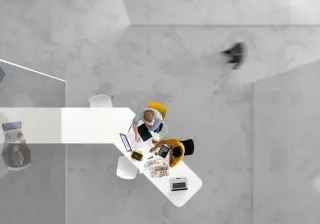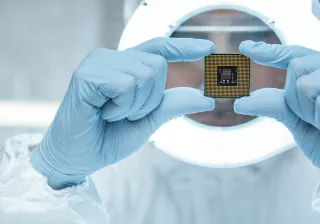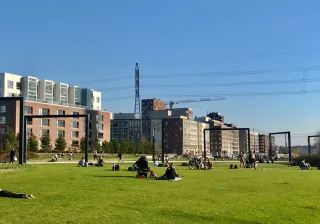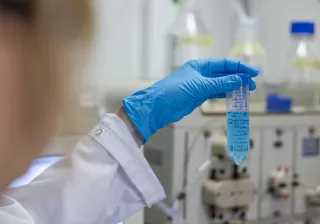Dear Reader, welcome to the Future Perspectives blog series exploring the role of technology in society! With this series we publish blogs on a monthly basis.
Our aim is to inspire curiosity and spark imagination from multiple perspectives for solving the complex challenges of our time. We believe this is needed, if we truly want to find new pathways and go beyond the obvious.
Our core argument is that new future capabilities are needed if we want to be effective and wise stewards of our increasing technological power. In this first piece, we give an overview of what we might mean with future capabilities and why we so urgently need them.
The content will be co-written by thinkers and doers across disciplines and sectors. We draw inspiration and synthetize latest knowledge from a variety of brilliant sources, such as the Consilience Project, Cynefin Company, Center for Humane Technology, and VTT’s latest projects, among others.
Why do we need to change the way we develop things?
Arguably, we are currently facing a global polycrisis that consists of seemingly separate problems such as climate change, biodiversity loss, energy, AI risk, geopolitical conflict, and global supply chain fragility. All of them are alarming issues in and of themselves. At the same time, they also reinforce each other.
For example, the type of social media content that is most engaging to users tends to polarize us as citizens, which in turn forces politicians to go more extreme, which in turn decreases our ability for effective long-term planning, which in turn nudges the global geopolitical balance in favor of authoritarian regimes. These cascade effects are almost universal. They may be hard to predict and measure, but nevertheless exist in our daily lives.
The interdependent reality of our global problem space combined with exponentially more powerful technology makes it so that we can no longer solve parts in isolation. Instead, we need to shift our focus towards the relationships between seemingly separate problems and to start addressing the underlying dynamics that give rise to all of them.

Perhaps, one of our most consequential examples of framing problems narrowly and then trying to solve them in isolation is climate change. If we study the rise of global atmospheric CO2 concentration mapped against our most significant efforts to address climate change: Our failure to make a dent in the rising curve, invites us to ask these questions:
To what extent is this failure due to insufficient resources put on the task? And to what extent is it, that we are not addressing the problem from the right place to begin with?
New future capabilities are needed
Addressing problems in a complexity-informed way requires new future capabilities. There is an urgent need for new thinking, new skills, and practices that increases our agency to actively take part in defining the future, and on the other hand, makes us more adaptive to whatever the future turns out to be. In short, we shall call these “superpowers” - future capabilities.
But when the future is emergent, and therefore inherently unpredictable, how can we really know what these future capabilities are?
In a stable society with little progress, we can assume that what has worked before, will likely work in the future as well. Considering the current world situation, this is unlikely to be the case. Thus, in addition to context specific capabilities, we need meta-skills that are adaptive in evolving contexts.
For example, teaching children to apply machine learning methods in Python might be a valuable skill set on today’s job market, but we cannot really know if it will be relevant in the future. On the other hand, teaching children, say, systems thinking will probably remain relevant regardless of what the future holds.
The future capabilities that can be learned in advance are primarily context independent.
There are no simple answers but let’s ask better questions!
The objective of this blog series is not to provide simple answers. Instead, we want to challenge the readers, and ourselves, to ask progressively better questions about how we could steer technological development in a way that supports the emergence of a more sustainable and meaningful future. It is then up to each of us to do the heavy lifting.
We propose the following areas where capacity building should take place. In our blog postings, we dive into the these themes more in detail.
- Build capabilities to optimize positive impact while minimizing harm
- Build capabilities to anticipate futures
- Build capabilities to navigate complexity
- Build capabilities to integrate natural sciences, social sciences & humanities
We are currently working on developing future capabilities at VTT as part of our renewed VTT iBEX programme. In the renewed programme research teams are continuously introduced to new thinking and tools derived from design, systems and complexity sciences, future studies, and impact evaluation. So far, we have hosted four external experts to broaden our perspectives on some very inspiring topics.
In January, we were introduced to designing radical transitions with Professor Derk Loorbach from the Drift Research Institute followed by a critique of current circular economy strategies with Simon Michaux from Geological Survey Finland. In April, we explored the role of technology in society with Professor Petri Ylikoski from the University of Helsinki followed by a discussion on impact evaluation with Professor Idil Gaziulusoy from Aalto University.
Recordings of both sessions are available:
- Challenging the transitions, presentations of Derk Loorbach and Simon Michaux
- Let’s talk about impact!, presentations of Petri Ylikoski and Idil Gaziulusoy
We have published the first VTT Futures Whitepaper that summarizes our learnings and recommendations from working on the renewal of the iBEX innovation programme in 2022.
Katri Kallio and Thomas Holm
Katri Kallio is Lead of Futures at VTT. Her current focus is on developing VTT's strategic foresight capability towards more holistic approach. She is a learning professional who aims to strengthen dialogue and mutual understanding of the constant change of the world and what requirements it sets for development of technologies and innovations.
Thomas Holm is the co-founder of Leapfrog Projects, an innovation consultancy. His current focus is on understanding the impacts of technological innovation in complex systems from individual organizations to society at large.
- VTT Futures Perspectives white paper: Beyond deep tech
- VTT Futures and iBEX: Building future capabilities: Scaling learnings & societal engagement
Blogs:
- Technology gave us the power of gods - Do we have the divine wisdom?
- Why do we need a new language?
- Efficiency engineering fails at managing complex systems
- Need for continuous development of systemic solutions to holistic challenges has never been louder
- Why we need to integrate natural sciences, social sciences and humanities?
- Art helps us find the means for a sustainable future













